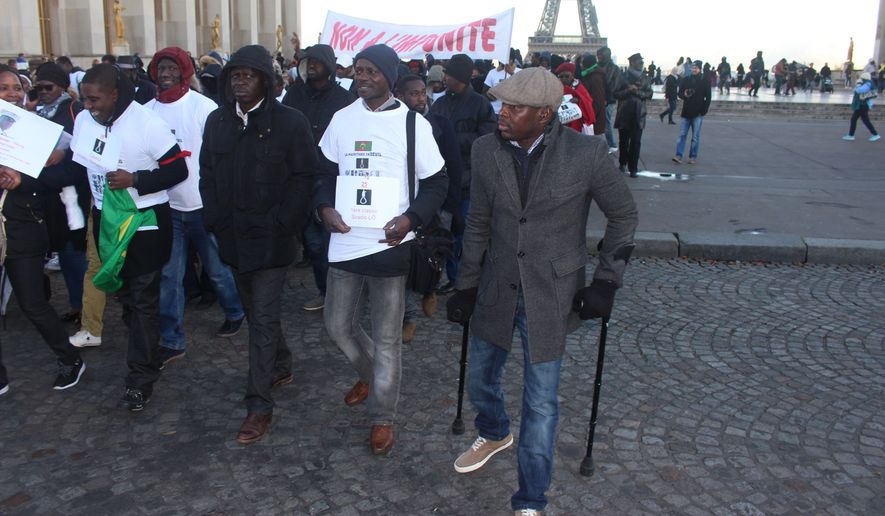It was the last country to permit slavery, legally banning it in 1981 and criminalizing the practice just 10 years ago.
But critics and human rights groups say little has changed to end the practice of human chattel and trafficking in the northwest African nation of Mauritania, where the government in Nouakchott has begun to arrest bloggers who write about an estimated 40,000 men, women and children still regarded as property by wealthy families. Foreign journalists risk losing their visas if they try to speak with those in bondage or their owners.
It’s an issue the Mauritanian exiles have been protesting the past month in Paris, calling for an end to human bondage in a country rated among worst in the world for slavery. The government has consistently denied that it tolerates slavery.
Mauritanian exiles in France plan to shine a fresh spotlight on the issue Saturday as the United Nations marks its official day for the abolition of slavery. Protesters will gather near the Eiffel Tower before marching through the center of Paris.
“People are still owned in Mauritania,” protest organizer Thomas Ndiaye said in an interview. Crippled from polio in childhood, Mr. Ndiaye walks on crutches at the head of every demonstration.
“We’re talking about people who are owned, bequeathed from one generation to the next, even presented as gifts at a wedding.”
Scholars say the practice dates back to raids in the 14th century, possibly earlier, when Arab traders came south looking for gold and slaves. Eventually, some of the newcomers stayed, colonizing huge areas of desert. Today’s captives are mostly dark-skinned descendants of the original black tribes, the largest of which are known as the Haratin.
The government of President Mohamed Aziz insists that slavery no longer exists in the country and blames reports on journalists or an anti-Islamic conspiracy. However, anti-slavery groups have confirmed the practice and say victims are mostly Haratin and others regarded as low-caste.
The 2016 Global Slavery Index, compiled by the Walk Free Foundation, puts the number of slaves in the country at 43,000, giving Mauritania one of the highest per-capita rates of slavery in the world.
“Slavery is entrenched in Mauritanian society,” the foundation said in its report. “Slave status is inherited generation to generation and is deeply rooted in social castes and the wider social system. Those owned by masters often have no freedom to own land, cannot claim dowries from their marriages nor inherit property or possessions from their families.”
All told, the analysts say some 45.8 million people were in some form of bondage or permanent servitude in 167 countries in 2016.
The CIA World Factbook, which gives a much higher estimate for the pervasiveness of slavery in the country, estimated that as much as one-fifth of Mauritania’s 3.67 million people are enslaved.
Staunch ally
For the U.S. and other Western powers, Mauritania has been a staunch ally in the fight against extremists, quickly lining up with Saudi Arabia and its allies in cutting ties with Qatar this summer over suspected ties to Iran and Islamist extremist groups.
The Trump administration has agreed in principle to a plan by former colonial power France to promote the G5 Sahel military alliance made up of five former French colonies: Mali, Niger, Chad, Burkina Faso and Mauritania. The idea is to have a single command base coordinating the fight against terrorist groups and making it easier to mount cross-border raids.
Paris puts the first-year budget for the G5 Sahel at a half-billion dollars, but the U.S. government says it plans to deal with each of the partners individually. In June, the U.S. had 645 troops in the region. Since then, the number has jumped to more than 800, according to the Pentagon.
Mauritania is largest of the G5 Sahel states that, collectively, cover an area twice the size of Alaska and is the only country in the group with a coastline.
President Mohamed Ould Abdel Aziz took power in a coup in 2008, deposing a democratic government that had been elected that same year after a coup in 2005. He has since held elections, though observer groups raised questions over the fairness of the polls.
Mr. Ndiaye said it was important to look at a wider scale of abuse.
“The U.N.’s day to end slavery is important. Of course it is,” he said. “But slavery shouldn’t distract from other problems in our country. Bloggers are arrested and held in custody. We have many in our march who have been tortured.”
Corruption, he said, goes “right to the top of government [and] is killing the economy. We are told there’s a shortage of money for schools and hospitals, but Aziz and his cronies live like billionaires.”
Under the constitution, Mr. Aziz’s second and last term ends in little over a year, but the opposition says he is planning to change the rule so he can stand again.
Michael Rubin, a security analyst at the American Enterprise Institute, warned that Mauritania “is now pre-9/11 Afghanistan.”
“The next devastating attack on Europe or the United States might just as easily be planned in this West African country as in Afghanistan, Pakistan, or Yemen,” he wrote recently in Commentary magazine.
Mr. Ndiaye said the protests in Paris were “growing larger with every meeting” and that demonstrations were planned for early next year outside the Mauritanian Embassy in Washington calling for free elections and for Mr. Aziz to stand down.
“The fight will not end,” he said. “Only when we have free elections and can go home without fear will we stop our protest.”




Please read our comment policy before commenting.